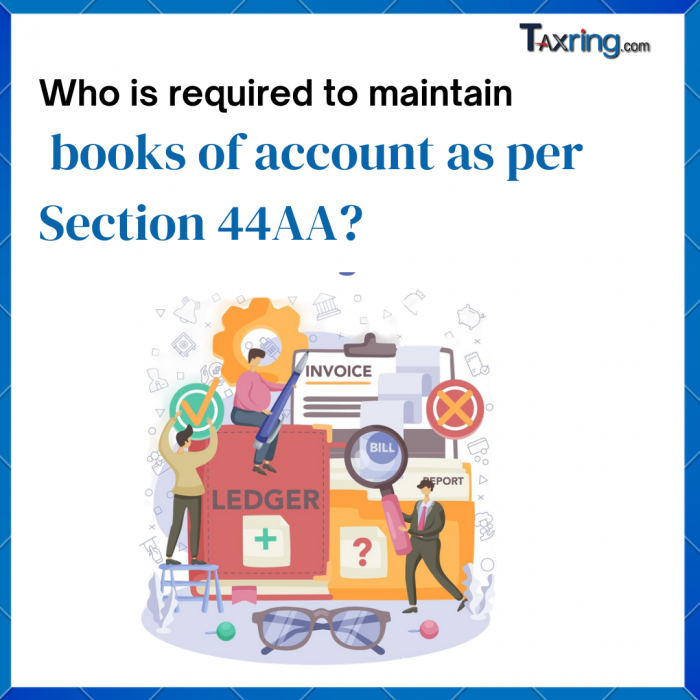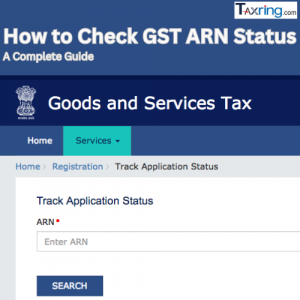
Books of Accounts Under Section 44AA: An Essential Record-Keeping Guide
The government is determined to stop tax evasion, and keeping thorough books of accounts is a crucial tactic. Section 44AA of the Income Tax Act stipulates that enterprises and people with significant incomes must maintain exacting records. A chartered accountant is additionally required by Section 44AB to verify the accuracy of these data through an audit. The audit report is attached to your income tax returns and acts as evidence of compliance. We'll go into great detail about Section 44AA's details and how they affect taxpayers in this tutorial.
Benefits of Maintaining Books of Account
1. Tax Compliance:
- Proper record-keeping ensures compliance with tax laws and facilitates smooth filing of income tax returns.
2. Financial Management:
- Accurate books help in effective financial planning and management, allowing you to monitor cash flow, profits, and expenses.
3. Audit Preparedness:
- Well-maintained records make audits more manageable and less stressful, as they provide a clear and comprehensive financial picture.
4. Legal Protection:
- Proper documentation protects you against legal disputes and potential penalties related to tax issues.
Who Needs to Maintain Books of Account?
Maintaining books of accounts is essential for certain taxpayers based on their income or business turnover. Here’s a clear breakdown of who must keep these records:
General Requirement
1. Business or Profession:
- If your business or profession has a gross income exceeding ₹1,20,000 or turnover/gross receipts over ₹10,00,000 in any of the last three years, you must maintain books of accounts.
- For newly established businesses or professions, if you expect income over ₹1,20,000 or gross receipts exceeding ₹10,00,000 in the first year, record-keeping is mandatory.
2. Increased Limits for Individuals or HUFs:
- Incom: If the income exceeds ₹2,50,000.
- Turnover/Gross Receipts: If it exceeds ₹25,00,000.
Specified Professionals
Certain professionals need to maintain books of accounts only if their income exceeds ₹1,50,000 in each of the last three years. These professionals include:
- Legal Professionals: Lawyers and legal consultants.
- Medical Professionals: Doctors and medical practitioners.
- Engineers: Including consulting engineers.
- Architects: Professionals in architectural design.
- Accountants: Chartered accountants and auditors.
- Technical Consultants: Specialists providing technical advice.
- Interior Decorators: Professionals in interior design.
- Authorized Representatives: Individuals representing others before authorities for a fee.
- Film Artists: Includes actors, directors, musicians, and other film-related professionals.
- Company Secretaries: Professionals managing corporate compliance.
If you’re a freelancer in any of these listed professions and your gross receipts exceed ₹1,50,000, you must adhere to these record-keeping rules.
Accounting Records
-For Businesses/Professions: Maintain books that help the tax officer compute taxable income accurately.
- For Specified Professionals: Follow the detailed record-keeping guidelines specified in Rule 6F.
Keeping precise books of accounts is crucial for tax compliance and financial clarity. Make sure you understand and follow these requirements to avoid any legal or financial issues.
Specified Books of Accounts to be Maintained Under Rule 6F
According to Rule 6F, the following books must be maintained:
1. Cash Book:
- Records all cash transactions, including receipts and payments.
2. Ledger:
- A detailed record of all accounts, including assets, liabilities, income, and expenses.
3. Journal:
- A chronological record of all financial transactions.
4. Books of Inventory:
- Details of stock and inventory, including purchases and sales.
5.Other Records:
- Any additional records required for specific professions or businesses.
Exemptions: When Is Bookkeeping Not Mandatory?
Not all taxpayers are required to maintain books of accounts. Exemptions include:
1. Presumptive Taxation Scheme: Taxpayers opting for presumptive taxation under Sections 44AD, 44AE, or 44ADA may be exempt from detailed record-keeping.
2. Income Below Threshold: Taxpayers whose income is below the threshold limit specified by the Income Tax Act may not need to maintain books of accounts.
Audit Requirements for Taxpayers
Certain taxpayers must undergo a tax audit, as mandated under Section 44AB. This includes:
1. Business Turnover: If turnover exceeds INR 1 crore (or INR 2 crore, in certain cases).
2. Professional Gross Receipts: If gross receipts exceed INR 50 lakhs.
Audit Report Form: The audit report must be filed in Form 3CB/3CD.
Due Dates for Audits and Report Submissions:
1. Audit Completion: The audit report should be completed before the due date for filing the income tax return.
2. Return Filing: Income tax returns must be filed by September 30 of the assessment year for those subject to audit.
Penalties for Non-Compliance with Section 44AA
Failure to comply with Section 44AA can result in:
1. Penalties: Non-maintenance of books can attract penalties up to INR 25,000 under Section 271A.
2. Increased Scrutiny: Inaccurate or missing records can lead to increased scrutiny by tax authorities and potential legal consequences.
Conclusion
Maintaining books of accounts under Section 44AA is not just a legal requirement but also a smart business practice. Proper record-keeping ensures tax compliance, aids in financial management, and protects against legal issues. Ensure that you meet all the requirements and deadlines to avoid penalties and complications.
Most Asked Questions
1. Who is required to maintain books of accounts under Section 44AA?
- Professionals and business owners whose income or turnover exceeds specified limits must maintain books of accounts.
2. What records are specified under Rule 6F?
- Cash books, ledgers, journals, books of inventory, and other relevant records are required.
3. Are there any exemptions to the record-keeping requirements?
- Yes, taxpayers under presumptive taxation schemes or those with income below certain thresholds may be exempt.
4. What are the penalties for not maintaining books of accounts?
- Penalties can be up to INR 25,000, and non-compliance can lead to increased scrutiny and legal issues.
5. When should the audit report be filed?
- The audit report should be filed before the income tax return due date, typically by September 30 of the assessment year.
By understanding and adhering to these guidelines, you can ensure proper compliance with tax regulations and avoid unnecessary penalties. For more detailed advice, consider consulting a tax professional.
Related article : Income tax Audit under section 44ab




